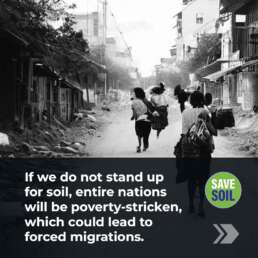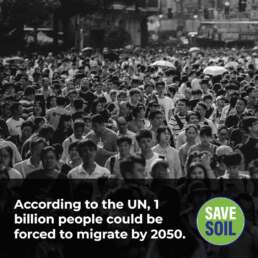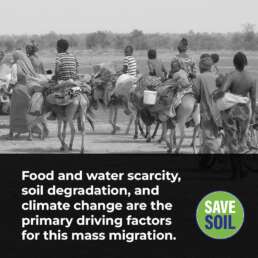What is a Soil Policy?
Soil policy is the set of guidelines or objectives that a government or other organization sets out to achieve in relation to the management of soil resources. The policy sets out a number of goals, including the promotion of sustainable land management practices, the rehabilitation of degraded lands, the prevention of land degradation, and the conservation of soil resources. To achieve these goals, the policy recommends a number of measures on national and regional levels.
Why do we need a Soil Policy?
The United Nations’ Intergovernmental Panel on Climate Change (IPCC) issued a warning that we have only a few years to take decisive action to avert a climate catastrophe. The world’s soils are a major part of the problem – and the solution.
Soils are the world’s largest carbon store, holding more carbon than all the plants and trees in the world combined. However, they are under threat from a range of human activities. It is estimated that around one-third of the world’s soils are degraded, and this proportion is increasing. We lose the equivalent of one soccer field of soil every five seconds, according to the Food and Agriculture Organization of the United Nations (FAO). This is not just an environmental problem.
Soil degradation has several serious consequences like,
- Food security: Soil is a vital resource for food production. It is the foundation of our food system and is necessary for the growth of crops. More than half of the world’s population – 3.5 billion people – depend on small-scale agriculture for their livelihoods. However, degraded soils are less productive, and can no longer support the growth of crops, thus declining crop yields and putting food security at risk.
- Water security: Soil degradation also has a major impact on water security. Healthy soils can absorb and store water, making them more resilient to drought. However, degraded soils are less able to do this, and are more susceptible to drought and water shortages. This is a major problem in many parts of the world that are already facing water shortages.
- Climate stability: Soil degradation also contributes to climate change. Healthy soils can help store more carbon, increase water retention, and improve drought tolerance. However, degraded soils release carbon into the atmosphere, contributing to global warming. Soils are also key to mitigating and adapting to climate change.
Soil degradation is a major problem that needs to be urgently addressed. The good news is that there are many cost-effective and practical ways to restore and protect soils. For example, farmers can implement conservation tillage, which leaves crop residue on the field to protect the soil from erosion. They can also plant cover crops, which help improve soil health.
However, to make a real difference, we need a global soil policy. This would give soils the attention they deserve and help to ensure that they are managed sustainably. There is no one-size-fits-all solution to soil degradation, as the causes and effects vary depending on the local context. However, some general principles of good soil management include promoting diversified land use, adopting agroforestry and other sustainable farming practices, and protecting natural areas. Furthermore, a soil policy would also send a strong signal to the private sector, which has a key role to play in funding and implementing soil restoration projects. Some things that could be included in soil policy are:
- Restrictions on farming practices that are known to cause soil degradation: Soil degradation is caused by a range of human activities, including intensive agriculture, deforestation, urbanization, and climate change. These activities are putting increasing pressure on our soils, and causing them to lose their fertility, productivity, and ability to support plant growth.
- Promotion of sustainable farming practices that help to protect and improve soil health
- Reforestation and afforestation efforts to help improve soil health
- Restrictions on urbanization and development in areas that are prone to soil degradation
- Support for research and development of new technologies and practices that can help to combat soil degradation
How is Save Soil by Sadhguru helping in developing a Soil Policy?
Sadhguru, a world-renowned yogi, mystic, and environmentalist, has been working tirelessly to create a sustainable model of development that is in harmony with Nature. One of the key areas of his work has been the area of developing a soil policy. The Save Soil movement run him is solely focused on spreading global soil awareness and asking world leaders to implement Soil Policy in their countries.
Since its start, the Save Soil movement has gathered support from all over the world. In India, the movement has the support of the Indian Council of Agricultural Research and the Ministry of Agriculture. The movement is also gaining traction in other countries and has received endorsement from organizations like the Food and Agricultural Organization of the United Nations. With the support of the Save Soil movement, the development of a soil policy is an important step in the right direction to protect and restore the health of the soil. Soil degradation is not a problem of one or a few countries – it is a global issue that needs support from everyone.
Here are some ways you can help be a part of the Save Soil movement:
- Educate yourself and others about the importance of soil.
- Advocate for policies that support sustainable land management practices.
- Most importantly, spread the word about the importance of saving our soil!
Soil policy won’t be easy to develop or implement, but it’s essential if we want to protect this vital resource. We need to change the way we value and manage soils, and put in place policies that will protect this vital resource for future generations. It is a vital resource for survival for any species including humans and treating it like a disposable commodity comes at the cost of our future generations.
The time to act is now. We need to put soils at the heart of our efforts to build a sustainable future.




